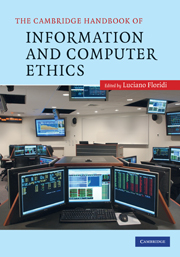Book contents
- Frontmatter
- Contents
- List of contributors
- Preface
- Acknowledgements
- Part I Introduction and background
- Part II Ethical approaches
- Part III Ethical issues in the information society
- Part IV Ethical issues in artificial contexts
- Part V Metaethics
- Epilogue: The ethics of the information society in a globalized world
- References
- Index
Epilogue: The ethics of the information society in a globalized world
Published online by Cambridge University Press: 05 June 2012
- Frontmatter
- Contents
- List of contributors
- Preface
- Acknowledgements
- Part I Introduction and background
- Part II Ethical approaches
- Part III Ethical issues in the information society
- Part IV Ethical issues in artificial contexts
- Part V Metaethics
- Epilogue: The ethics of the information society in a globalized world
- References
- Index
Summary
Introduction
The previous chapters have provided a detailed overview of the variety of ethical challenges posed by the development of ICTs. By way of conclusion, in this epilogue I would like to invite the reader to look into the possible future of Information and Computer Ethics. More specifically, I shall try to forecast how the convergence of two fundamental trends of our times, globalization and the development of the information society, may interact with the ethical problems analysed in this book. The exercise will not be based on some untenable technological determinism. Humanity is, and will remain, firmly in charge of its destiny and hence be responsible for it. Rather, it will mean adopting the farmer's view that, with enough intelligence, toil and a bit of luck, one might be able to tell today what one will probably reap tomorrow. Before trying to ‘look into the seeds of time, and say which grain will grow and which will not’ (Shakespeare, Macbeth, Act I, Scene III, 59–62), two clarifications might be in order.
First, the future of globalization is a phenomenon too complex even to sketch in this brief epilogue. For a synthetic, well-balanced and informed overview, the reader may wish to consult Held and McGrew (2001) and consider that this chapter is written from what Held et al. (1999)) have defined as a ‘transformationalist perspective’, according to which ‘globalization does not simply denote a shift in the extensity or scale of social relations and activity.
Information
- Type
- Chapter
- Information
- The Cambridge Handbook of Information and Computer Ethics , pp. 271 - 283Publisher: Cambridge University PressPrint publication year: 2010
Accessibility standard: Unknown
Why this information is here
This section outlines the accessibility features of this content - including support for screen readers, full keyboard navigation and high-contrast display options. This may not be relevant for you.Accessibility Information
- 3
- Cited by
